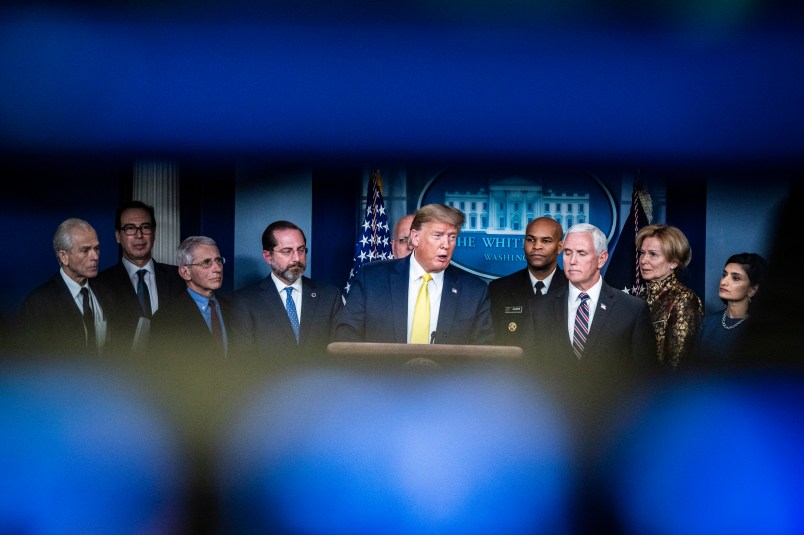States are scrambling to prepare and respond to the coronavirus outbreak, petitioning Washington for changes to federal health insurance programs that could help them save lives.
And there’s a way to do it, but it requires one thing: an emergency declaration from President Trump.
Known in the dense legalese that surrounds government insurance programs as a section 1135 waiver, the option allows states to adjust elements of their Medicaid heath insurance programs to respond to an emergency.
States can apply for the waivers only once a President has declared an emergency under the 1988 Stafford Act — which Trump has yet to do, reportedly in part to avoid contradicting himself after he downplayed the severity of the virus.
Dave Richard, deputy secretary for North Carolina Medicaid, told TPM that the state was only considering applying for Medicaid changes that would be possible following an emergency declaration.
“We’re talking to CMS,” Richard told TPM. “This is much more about long-term care services, trying to look at things that would help for as extended a period of time as we’re in this crisis.”
The changes would help the state create surge capacity at medical facilities in the event of a serious outbreak, while also ensure that health-care workers who treat the elderly in long-term facilities — prime candidates for serious infection — themselves have adequate care.
With thousands of Americans infected and dozens dead, the Trump administration has yet to find a way to effectively test for the presence of the novel coronavirus. But it’s the President’s ongoing refusal to declare an emergency over the disaster — which would unleash aid, funds, and FEMA — which continues to hamper state-level planning.
Medicaid Health Plans of America, the program’s trade association, issued a statement on Wednesday demanding that CMS set consistent guidance for state departments of health that would include waiving cost sharing for people who are testing for or have been diagnosed with COVID-19.
The trade association reportedly met with CMS representatives late Wednesday to discuss how Medicaid could be used to address the crisis.
“People served by Medicaid include populations that are especially vulnerable to the spread of viral diseases, particularly older adults and individuals with chronic, underlying health conditions,” the statement reads.
Different states have addressed the crisis differently. Florida Medicaid announced on Monday that it would cover testing and treatment of the novel coronavirus. The state did not return a request for comment about whether it would seek a 1135 waiver, but CMS told TPM that it’s in contact with all the states about potential waivers.
Washington State’s top public health official told TPM on Tuesday that the state was discussing the potential Medicaid change with the Trump administration, and holding out for the President to declare an emergency.
With eight documented cases, North Carolina has something of a head start on other states. As tested, the outbreak has taken longer to reach the state, giving authorities more time to prepare.
And yet, officials are already anxious about what may come without a declaration.
“If it appears that we need one. If they haven’t done so, and we haven’t had that guidance, we’ll be lobbying them to do that,” Richard said.
He said that the state had divided its response into phases, with the first array of policies focused on what could be done “without federal authority.”
But the second phase, for which a 1135 waiver is necessary, remains the subject of discussion with CMS officials.
Richard said that the state’s biggest concern dealt with people in long-term care – either the elderly or people who otherwise require medical treatment over an extended period of time.
The changes, Richard said, would allow the state to make rules changes that covered more services in long-term care, allowing people to either stay at home or in the existing facility.
The focus would also be a shift towards “keeping people on the program,” allowing the state to remove requirements that would have seen people removed from Medicaid coverage.






